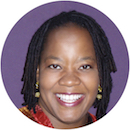One of the most transcendent aspects of our work is feeling the power of our churches—to witness and participate with lay people and clergy alike—wrestling with the questions:
- What constitutes power and the ability to use one’s voice?
- How does race and class commingle to create virulent barriers to social equity and equal justice?
- How can we and how do we, as people of faith, come together in creating the kin-dom of God?
- How, in developing the beloved community that is an authentic reflection of Jesus’s love, can we contemplate and respond to the world’s most pressing problems?
Contemplating how we use our voices and how comfortable we are in being heard provides us with the opportunity to examine the assumptions we make in how people listen to our opinions and perspectives.
Issues of who we are—our gender, race, where we live, our education level, what we do for a living, what denomination we are, our financial resources—all influence and impact what extent we are able to speak, and if we are listened to—issues of power and privilege that many of us do not even think about.
Looking at the myriad issues of social justice and the ability to craft thriving lives—environmental justice (whether or not you have a trash incinerator in your community), educational access (what tax base your community has that relates to the resources available to local schools), gender equality (why particular industries have such low representation of women, i.e., the technology field), and racial equality (the phenomena of “driving while Black”)—all represent the intersection of race, class, privilege, prejudice, and institutional bias.
So where does that leave us? Those of us who are spiritually rooted and grounded by our religious traditions possess perspectives that make us unique in our orientation towards advocacy and social justice. Because Jesus Christ calls us in varying ways to respond to injustice and social inequities, we can offer our communities and congregations the opportunity to engage in community service, advocacy and community education knowing that helps us build the beloved community. Our advocacy, borne out of the moral authority inspired by God, can be and is a powerful mechanism for building and sustaining vibrant congregations and church communities.

Dr. Diane Johnson is CPR’s Director of Strategic Development and a Senior Consultant—working with congregations, clergy, UCC conference offices, and adjudicatory offices from other denominations to help with the inspired growth, development, revitalization and planting of congregations seeking new and innovative ways of fulfilling God’s promise. Diane considers herself a spiritual activist—one who is called by the Divine to work towards crafting a just and equitable world.
